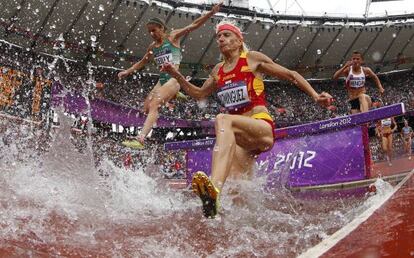Domínguez in the eye of the storm
IAAF is seeking doping sanction for Spain’s most decorated athlete but suspects national federation is dragging its heels

At the outset of the World Championships, International Association of Athletics Federations (IAAF) lawyer Thomas Capdevielle, the father of the biological passport, described its importance in the battle against doping. "It is our biggest weapon, whose worth as evidence to sanction athletes has been ratified by the Court of Arbitration for Sport," he said with pride. "We will dedicate more money and more effort toward it."
But when Capdevielle was quizzed about a single case — that of Spanish 2009 3,000m steeplechase world champion Marta Domínguez — the lawyer lost a touch of loquacity. "I cannot talk about specific cases," he replied, but did not deny that one of the 20 passports that are under suspicion belongs to the Popular Party senator for Palencia. "But in general terms, these cases take more than a year to resolve because although we are certain of the scientific value of the tests, we also have to be so legally and lawyers acting for athletes always look for any loophole to prolong procedures and have them annulled."
Capdevielle also did not confirm whether the IAAF has sent Domínguez's case to the Spanish federation (RFEA), which must decide her fate in the first instance. According to a Spanish sports daily report Sunday, the file was sent to RFEA president José María Odriozola two weeks ago and a process against the most decorated Spanish athlete of all time has been initiated.
During the opening days of the Moscow meet, Odriozola, a self-confessed admirer of Domínguez, said in an interview with news agency DPA that biological passport test results show "probable" evidence of doping but are not "100-percent certain." Odriozola's comment angered IAAF anti-doping officials, who reminded the Spaniard that he had applauded the introduction of the passport when its use had snared various Russian athletes.
If found guilty, she will lose her Berlin World Championship gold
It was also questioned how a member of the executive board of the IAAF such as Odriozola could publicly cast doubts over its principal anti-doping weapon. It is also believed by IAAF officials and their Spanish anti-doping counterparts that Odriozola's declarations were an attempt to mount an a priori defense of Domínguez's innocence and was a hint as to the direction the deliberations over her case by the RFEA disciplinary committee (made up of three lawyers and an independent magistrate) are taking.
When opening the investigation into Domínguez, the IAAF (according to sources close to the international body) already suspected that in some way the Spanish federation would try to throw a few obstacles in the way of a sanction of its own athlete. The IAAF has already taken the decision to appeal any negative verdict from Spain at the Court of Arbitration for Sport (CAS) so that the Lausanne institution can apply its own scientific criteria to determine beyond doubt that Domínguez has committed a doping infraction in the past.
The process may thus drag on for some months in a repeat of the so-called Contador case: the Tour de France winner was cleared of ingesting clenbuterol by the Spanish Cycling Federation but subsequently handed a two-year ban by the CAS and stripped of his 2010 Tour title.
A similar fate may await Domínguez, who at 37 is now practically retired. Nevertheless, any eventual sanction would be hugely symbolic, as in the case of Lance Armstrong: if found guilty, she will lose her 2009 World Championship gold as the first suspect results recorded in her biological passport correspond to the same year.
Tu suscripción se está usando en otro dispositivo
¿Quieres añadir otro usuario a tu suscripción?
Si continúas leyendo en este dispositivo, no se podrá leer en el otro.
FlechaTu suscripción se está usando en otro dispositivo y solo puedes acceder a EL PAÍS desde un dispositivo a la vez.
Si quieres compartir tu cuenta, cambia tu suscripción a la modalidad Premium, así podrás añadir otro usuario. Cada uno accederá con su propia cuenta de email, lo que os permitirá personalizar vuestra experiencia en EL PAÍS.
¿Tienes una suscripción de empresa? Accede aquí para contratar más cuentas.
En el caso de no saber quién está usando tu cuenta, te recomendamos cambiar tu contraseña aquí.
Si decides continuar compartiendo tu cuenta, este mensaje se mostrará en tu dispositivo y en el de la otra persona que está usando tu cuenta de forma indefinida, afectando a tu experiencia de lectura. Puedes consultar aquí los términos y condiciones de la suscripción digital.









































